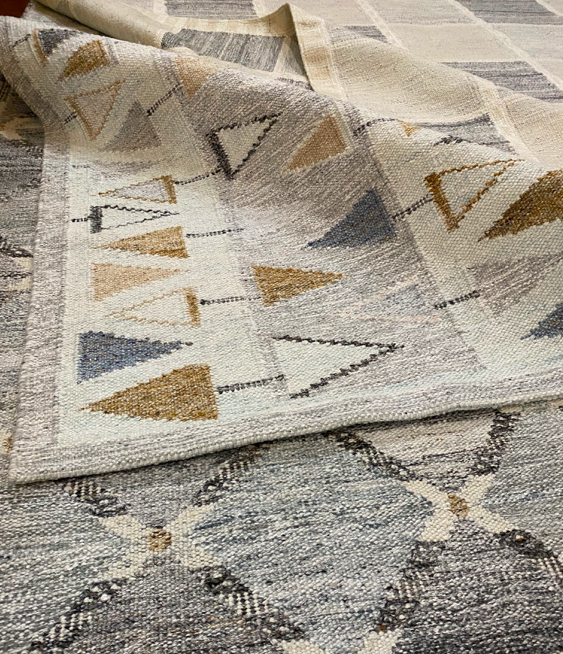Scandinavian Rugs
Scandinavians have been making rugs in Denmark, Finland, Norway and Sweden for centuries. They were exposed to fine oriental rugs from trade via the silk routes. Scandinavians traded heavily with the Byzantine empire in Constantinople, bringing Anatolian rugs back to Northern Europe. These rugs were hung in stately homes for insulation purposes and used as blankets by Scandinavian noblemen. In the 14th century the people of Scandinavia began to develop their own distinct style called Rya. These rugs have a thick shaggy long pile designed to help people weather the harsh winters. Examples of these rugs are found in York from excavated Viking settlements.
More traditional oriental themes were often included in Scandinavian rug weaving. The tree of life motif was the most common and was adapted in Scandinavia to represent family trees. Also used for dowry pieces representing both the bride and groom's families with hearts, symbols, dates and initials.
Later Sweden started to produce a new style, Rolloakan. These pieces are flat woven rugs with elaborate tapestry art, making them distinctively different from the abstract thick pile Ryas. This took the craft of rug making into a new direction.
Contemporary Scandinavian rugs are some of the most sought after today. Largely due to the popularity of rug artist Marta Mass-Fjtterstrom, one of the most well known names in rug making. Famous artists and designers such as Ray Eames, Le Corbusier & Frank Lloyd Wright incorporated Marta's rugs in their designs.
Marta created intimacy of the natural world through lines and geometric forms in rugs. These pieces remain in some of the most exclusive art museums around the world. After her death in 1941 the demand for her designs sky rocketed. She left behind meticulous instructions on how to make these rugs. Even though tastes have changed since the 20's and 30's Scandinavian rugs are still used in modern minimalist design.
At PAO we offer a variety of reproduction Swedish Kilims that can be customized by color, design and size. See below for examples of how "weave" incorporated vintage designs in new projects!
THE source for all Scandinavian rugs and textiles
The Breakdown of Scandi Home Decor
and Interior Design Elements as described by Nazmiyal
So what makes Scandi decor what it is? A home that demonstrates proper Scandinavian interior design elements will have multiple iterations of these elements:
High contrasts, often involving black and white
The use of natural light to highlight certain areas
Modern furniture that goes easy on the color palettes
Simple furniture that is orderly, not cluttered
If featured art, often in multiples of a similar design
What holds it all together is the continuation of the theme throughout a whole house. If you have executed this correctly, things will seem well-spaced and harmonious while still being cozy and inviting.







